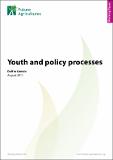Youth and policy processes
Abstract
The rapid and sustained increase in the number of young people in the global south is one of today’s most significant demographic trends. Around 90 percent of young people reside in developing countries (Shankar 2010). By 2030 Africa is projected to have as many youth as East Asia and by 2050 could also exceed the youth population in South Asia (Garcia and Fares, 2008). Young people make up approximately 30 percent of the total population in African countries, and this is increasing fast (Panday 2006). Growing numbers of young people entail a process of demographic change within societies; ‘rejuvenation’ in a literal sense. Thus, in 2005, 76 percent of the Zambian population were under 30 years of age, with those between 20 and 29 years accounting for a mere 18 percent (CSO 2007, p.12 in: Locke and Verschoor 2007).
Whereas some expert commentators are pessimistic about the prospects for economic growth and poverty reduction in Africa (e.g. Collier 2008), youth bulges are recognised by many as a window of opportunity. They are seen to potentially offer a demographic dividend: where a larger workforce with fewer dependents could generate strong economic growth (Fares and Garcia, 2008; Gunatilake et al, 2010). Yet, experiences to date are mixed: while in East Asia, the policy and institutional environment facilitated the harnessing of the demographic dividend to achieve strong growth, similar demographic dynamics in Latin America failed to yield better economic outcomes (Fares and Garcia, 2008).

